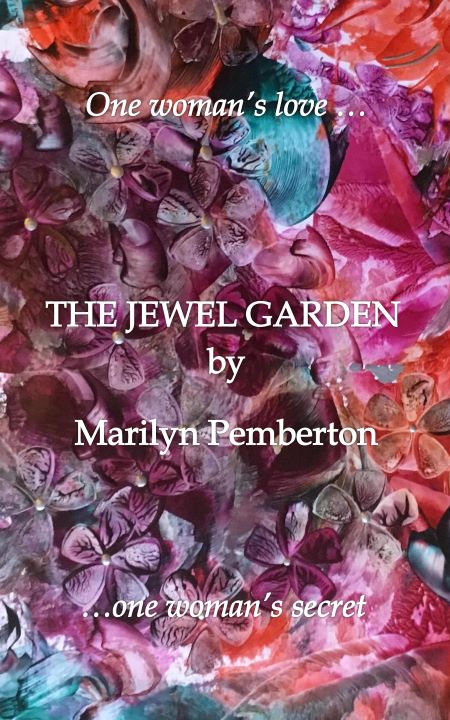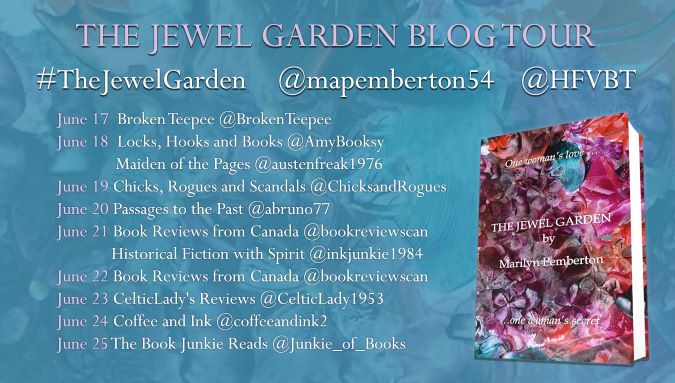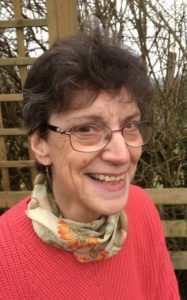The Jewel Garden by Marilyn Pemberton Blog Tour!

The Jewel Garden by Marilyn Pemberton
Publication Date: February 28, 2018
Williams & Whiting
eBook & Paperback; 388 Pages
ISBN-13: 978-1912582037
Genre: Historical Fiction
It was a time when women were starting to rebel against Victorian conventions and to strive for their independence. This is a story of Hannah Russell’s physical, emotional and artistic journey from the back streets of the East End of London to the noisy souks and sandy wastes of Egypt; from the labyrinthine canals of Venice to the lonely corridors of Russell Hall in Kent. Hannah thinks she has found love with Mary De Morgan, a writer of fairy tales and one of William Morris’s circle of friends. But where there is devotion there can also be deceit and where there is hope there also dwells despair.
Available on Amazon
About the Author
Marilyn Pemberton has always worked in IT and is still a full-time project manager, but is hoping to retire very soon. At the age of 40, she decided she wanted to exercise the right side of her brain and so commenced a part-time BA in English literature. This progressed to an MA and then to a PhD on the utopian & dystopian aspects of Victorian fairy tales. During her research, Marilyn “discovered” Mary De Morgan, a Victorian writer of fairy tales, amongst many other things. She became somewhat obsessed with De Morgan and as she wanted to share her research she wrote Out of the Shadows: The Life and Works of Mary De Morgan, which was published by Cambridge Scholars Publishing in 2012. Despite her intensive research, there were still many gaps in her knowledge and because she just could not let De Morgan, or the act of writing, go she decided to write a fictional novel based on De Morgan’s life – the result being "The Jewel Garden." Marilyn is currently looking for representation for her second novel, "Song of the Nightingale," which is set in 18th century Italy and tells of two young boys who are bought from their families, castrated and then trained to be singers. The fate of the boys as castrati is an integral part of the tale, of course, but it is also a story of adulterous passion, deceit, murderous revenge, guilt, and enduring love. Marilyn is now working on a third novel called "Grandmothers' Footsteps" that will tell of four generations of women and their attempts to tell their “herstories” to a world deaf to the female voice.Website | Facebook | Twitter | Goodreads
***AUTHOR INTERVIEW***
What literary pilgrimages have you gone
on?
I have written a biography of a Victorian writer called Mary
De Morgan (Out of the Shadows: The Life and Works of Mary
De Morgan). She died in Egypt in 1907 and is buried in
Cairo. I went for a holiday to Egypt a few years ago with my two
sisters to celebrate one of them being 60. Whilst in Cairo I declined
a visit to one of the tourist sites and took myself off to the
cemetery where Mary was buried. I had found the plot number in some
papers held in the archives at Kew, London, so I knew exactly where
her last resting place was. Unfortunately, there had been subsidence
over the years and there was nothing left to mark her grave - just an
area of flat sand. I was nonetheless still incredibly moved.
What is the first book that made you
cry?
I am 64 years old and I have read a lot of books and honestly
can’t remember. As a child I read Enid Blyton - I can’t imagine
she had me in tears!
What is the most unethical practice in
the publishing industry?
Asking an author to pay money towards
publishing, as so-called vanity publishers do.
Does writing energize or exhaust you?
Energise.
What are common traps for aspiring
writers?
Thinking that what you write today is the final version
and can’t be improved, thinking that writing the book is the
hardest part (wait till you try and write the synopsis!), thinking
that getting a book published will be easy.
Does a big ego help or hurt writers?
All writers have to have a belief in themselves and a feeling of
self-worth - it is often the only thing that keeps us going. But if
an ego means that you feel you are better than other writers or more
deserving to get published - then that is hurtful to self and other
writers.
What is your writing Kryptonite?
Rejection after rejection after rejection, making me think that
what I am writing must be rubbish after all.
Have you ever gotten reader’s block?
No.
Did you ever consider writing under a
pseudonym?
No.
Do you try more to be original or to
deliver to readers what they want?
I have a story to tell and I
tell it in my own way. I am not trying to please readers - after all,
there are potentially so many and you can’t please all of them. I
suppose I write to please myself in the hope that others will also
enjoy.
Do you think someone could be a writer
if they don’t feel emotions strongly?
Of course. You don’t
need emotion to write non-fiction. Nor are all fiction books are
about emotions - a straightforward “whodunnit” for instance, or
perhaps a science fiction doesn’t usually spend much time on the
emotions.
What other authors are you friends
with, and how do they help you become a better writer? I have been
a member of a local writing group for a number of years. The leader
is a published writer and the other members all write with varying
success. We are all tremendously supportive of each other and offer
useful feedback when extracts are read out. I would recommend every
new writer to join a writing group.
Do you want each book to stand on its
own, or are you trying to build a body of work with connections
between each book?
Each book stands on its own, so far anyway.
If you could tell your younger writing
self anything, what would it be?
I actually started writing
fiction when I was 60. That was the right time for me to start so my
younger self wasn’t writing at all.
How did publishing your first book
change your process of writing?
It didn’t really, to be honest.
What was the best money you ever spent
as a writer?
I am hoping it will be this blog tour!
What authors did you dislike at first
but grew into?
None come to mind.
What did you do with your first
advance?
Ha! I have never had one.
What was an early experience where you
learned that language had power?
When I read books for my BA that
I learned had actually resulted in society being changed and
improved. Charles Kingsley’s The Water Babies,
for instance, resulted in significant changes to the laws regarding
sending children up chimneys.
What are the most important magazines
for writers to subscribe to?
A writer doesn’t have
to subscribe to any magazine - they should do so only if they want
to, not because they feel they aught to. I buy Writers’
Forum and as I am a member I also get the magazine from
Society of Authors and the Historical
Novel Society.
What’s your favorite
under-appreciated novel?
My own!!
How do you balance making demands on
the reader with taking care of the reader?
The Jewel Garden is
set during the Victorian era and, of course, things were different
then. I try and describe things as part of the story so that readers
feel that they are living in those times, but I don’t spend pages
“telling” in great detail. Part of the book is located in Egypt
and I include a few Arabic words and phrases - I sometimes offer a
translation but not always, the words are there to add to the
atmosphere, not to drive the plot. I also like to leave some things
to the readers’ imagination and for them to make up their own minds
about certain events. I don’t always tie up loose ends - life just
isn’t like that.
As a writer, what would you choose as
your mascot/avatar/spirit animal?
Sorry, no idea.
What do you owe the real people upon
whom you base your characters?
The one person who has been a huge
inspiration is Mary de Morgan, a Victorian writer. I “discovered”
her whilst researching for my PhD on Victorian fairy tales and I
became (and still am) totally obsessed with her. I wrote her
biography (Out of the Shadows), followed by a
novel based on her life (The Jewel Garden). I am
now on my third novel and intend to continue until I die - so she
really set me on the writing path.
How many unpublished and half-finished
books do you have?
Three: Song of the Nightingale
is a historical novel waiting for a literary agent to spot its
potential; I also have a children’s book, The lion who
lost his roar, also waiting to be discovered. I am in the
process of writing my third historical novel, Grandmothers’
Footsteps, that will tell of three generations of women
who have “her”stories to tell but who are not heard by a
patriarchal society.
What does literary success look like to
you?
Having a literary agent love my books enough to want to
represent me. It is nothing to do with money but more to do with
someone else agreeing that the books are good.
What’s the best way to market your
books?
I wish I knew. I have joined FaceBook and Twitter
(something I managed to avoid until I had my first book published), I
write Press Releases, I submit the book to numerous competitions, I
give talks in libraries, I have my own blog and write for others.
This blog tour is yet another attempt to get my book out there. I
doubt there is a simple or single answer.
What kind of research do you do, and
how long do you spend researching before beginning a book?
I do a
lot of research. I buy books, browse the internet, search archives,
visit places. I research throughout the writing process but I suppose
I take a few months to begin with just writing up the basic things I
know - it won’t all be included in the book but is there for me to
understand how life was lived and what their concerns were, so that I
can write about the people and events as accurately as possible.
Do you view writing as a kind of
spiritual practice?
Not sure what you mean.
What’s the most difficult thing about
writing characters from the opposite sex?
Knowing how they think!
My second novel is written in the first person from a man’s
perspective - time will tell if readers think I have got it right.
How long were you a part-time writer
before you became a full-time one?
I am still a part-time writer
as I have a full-time job. But when I retire at the end of 2019
then, oh joy, I can write full-time.
How many hours a day do you write?
Up
until a few weeks ago I only wrote at weekends and only when I wasn’t
visiting my grand-children, which always takes priority - so probably
minimum 0 hours to maximum 7 each weekend day. But I have just got
rid of my television (absolute bliss - I strongly recommend it) so I
try and do some writing each evening after work - probably only an
hour or so, but it all adds up.
What period of your life do you find
you write about most often?
I don’t
write about my life. My books mainly focus on the adult years of the
protagonists, but every book is different.
What did you edit out of this book?
Sorry, not sure what you mean.
Have you read anything that made you
think differently about fiction?
All the books I read as part of
my PhD!
What are the ethics of writing about
historical figures?
Try and be as accurate as possible and not
represent them as people they were blatantly not. In The
Jewel Garden I had Mary de Morgan visiting places, doing
things and meeting people I knew she really had from my research but
I also put words into her mouth she didn’t say and I had her have a
relationship she didn’t have. But this is fiction and I do explain
at the end of the book that much of the book is fact but most is
fiction. I will be very honest here and admit that I actually
changed the year of Mary De Morgan’s death, which has been strongly
criticised by one reviewer only. Most readers don’t know or care
but this one reviewer was incensed. I had my reasons for changing the
year of her death, which I have recorded in my blog. In retrospect I
was probably wrong to make such a fundamental change but to be honest
I don’t think it makes a jot of a difference to the story or to the
readers’ enjoyment.
How do you select the names of your
characters?
I try and pick a name that is right for the era, that
is memorable and not similar to another name in the story, and is
easy to type!
If you didn’t write, what would you
do for work?
I don’t write for work and never will.
Do you read your book reviews? How do
you deal with bad or good ones?
I do read them. I only have 17 on
Amazon for The Jewel Garden but they are all
wonderful. I had a bad one printed in a magazine (the one that
criticised me for changing the death of Mary De Morgan) and I was
absolutely gutted. I felt as if I had been punched in the stomach. It
resulted in me writing a blog and I will never do such a thing again.
Do you hide any secrets in your books
that only a few people will find?
Not knowingly although perhaps
changing the year of Mary’s death can be considered a secret? It
wasn’t intended to be a secret.
What was your hardest scene to write?
The end. Just because I knew it was the end and I was sad to
finish the book.
Do you Google yourself?
No.
What one thing would you give up to
become a better writer?
Work!
What are your favorite literary
journals?
The one sent out by the Historical
Novel Society
What is your favorite childhood book? I
always remember Bimbo and Topsy - a book
about a dog and a cat, written by Enid Blyton (I had to Google it as
I didn’t remember who had written it) and also her The
Wishing Chair - how I loved that book.
What is the most difficult part of your
artistic process?
As a Planner I know the story I want to tell and
the key scenes are plotted and written onto colourful post-it notes
that are stuck to the wall. But I still sometimes find it hard to
break down the concept into actual words. I have to stop looking at
the big picture and dive into the detail and focus on a single event
or conversation. Then the words start to flow, but it can sometimes
take a while and will often involve going for a walk.
Does your family support your career as
a writer?
Yes, they listen to me witter on about my writing ad
nauseum. My sisters have bought my book and one of my sisters has
read the second one and given feedback. My two children were happy to
receive a copy of the book and were pleased that I had dedicated it
to their own children - but I don’t think either of them have
actually read it!
If you had to do something differently
as a child or teenager to become a better writer as an adult, what
would you do?
Nothing. I see no point in looking back and wishing
things were different.
How long on average does it take you to
write a book? Difficult to say having only written 3 books. 2 - 3
years on average.
Not sure “believe” is the right word. If
someone thinks they have writer’s block then I would never say “I
don’t believe you” - that would be extremely arrogant and
unsupportive. I have often sat down to write and not produced
anything - is that writer’s block or just a lack of inspiration at
the time?
Blog Tour Schedule
Monday, June 17 Excerpt at Broken Teepee Tuesday, June 18 Review at Locks, Hooks and Books Interview at Maiden of the Pages Wednesday, June 19 Feature at Chicks, Rogues and Scandals Thursday, June 20 Interview at Passages to the Past Friday, June 21 Review at Book Reviews from Canada Excerpt at Historical Fiction with Spirit Saturday, June 22 Guest Post at Book Reviews from Canada Sunday, June 23 Feature at CelticLady's Reviews Monday, June 24 Review at Coffee and Ink Tuesday, June 25 Excerpt at The Book Junkie Reads


Great interview! Thank you so much for hosting Marilyn's blog tour!
ReplyDeleteAmy
HF Virtual Book Tours